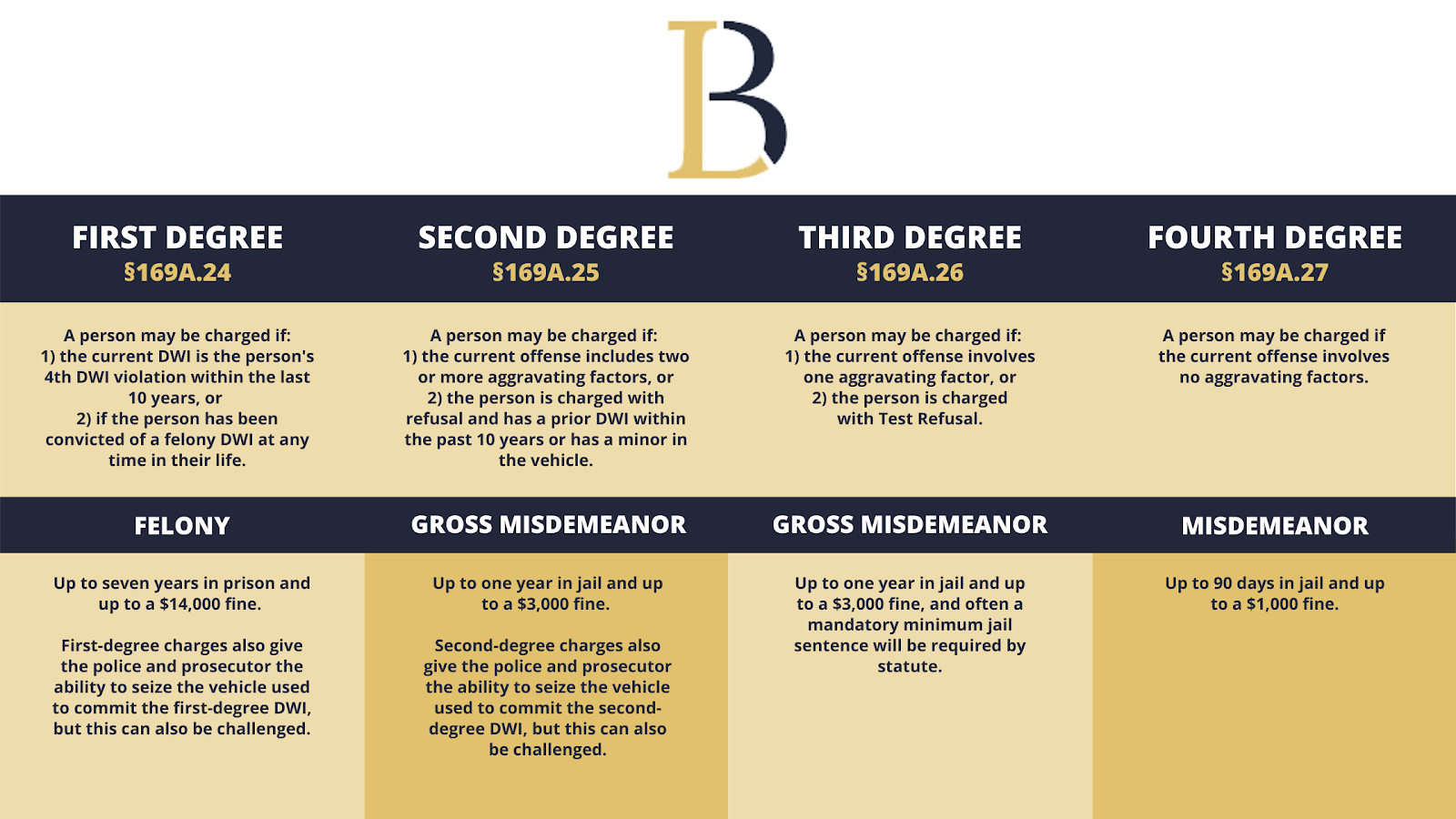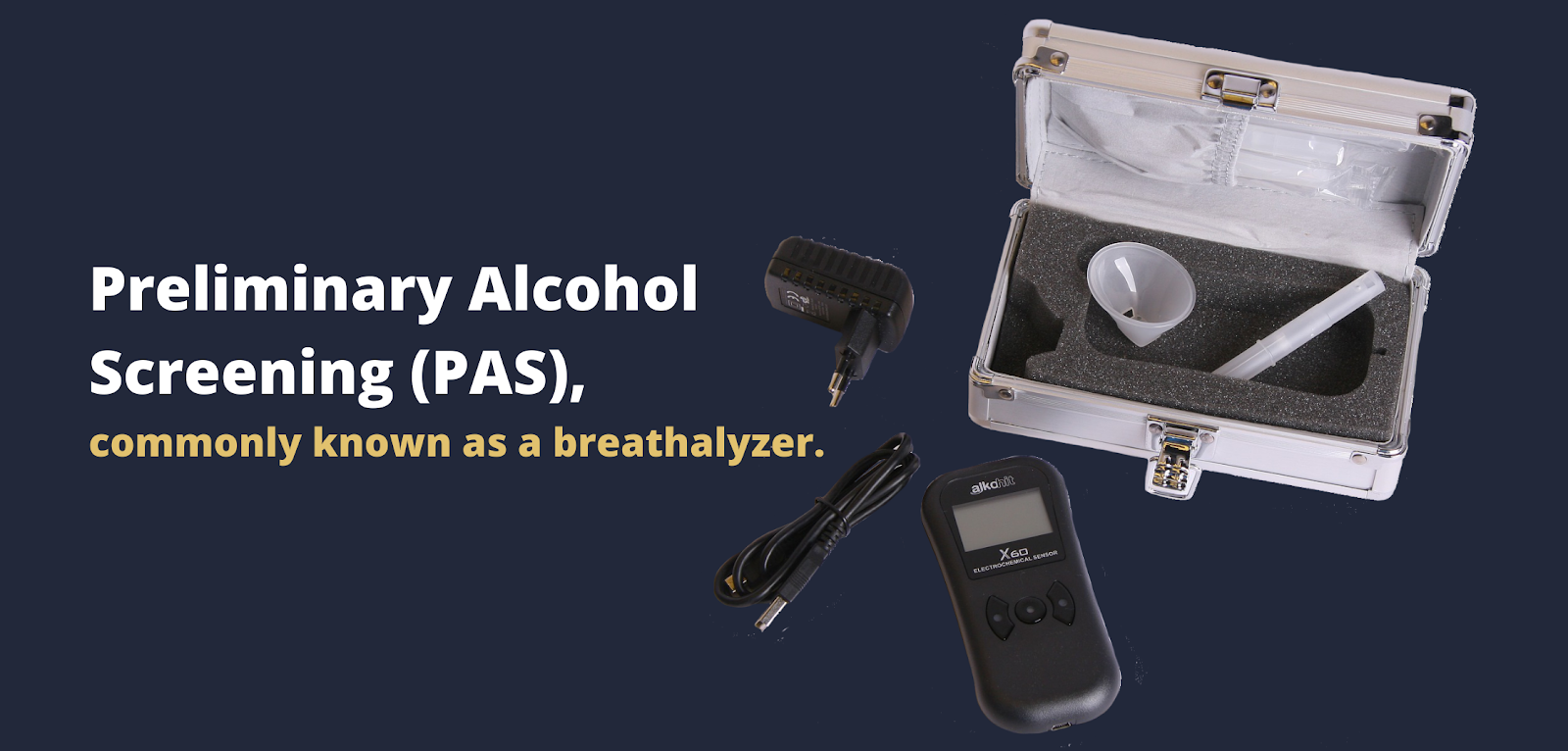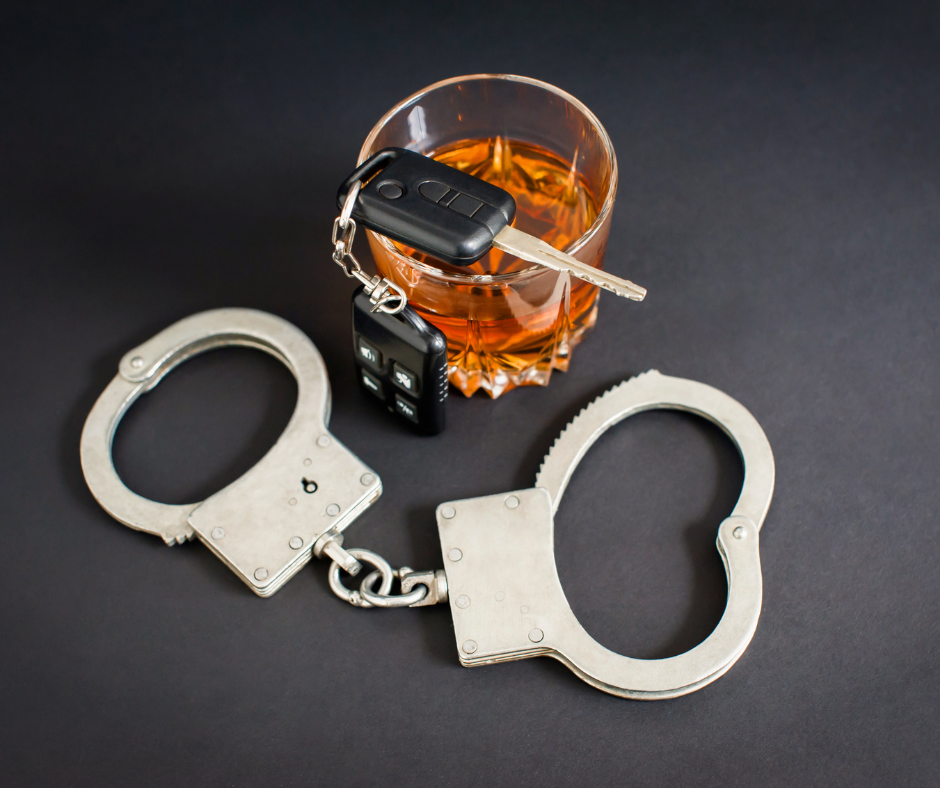What Happens After A DWI Arrest In Minnesota
In the state of Minnesota, Driving While Impaired (DWI) is defined as driving, operating, or having physical control of a motor vehicle while:
- Under the influence of alcohol or drugs
- Knowingly under the influence of a hazardous substance that affects the body and substantially impairs driving abilities
- Having a blood alcohol concentration (BAC) of .08% or greater
- Having any amount of a Schedule I or II drug, except marijuana, in the body
There are four degrees of DWI charges in Minnesota, from fourth degree, which is a misdemeanor, to first-degree, which is a felony. The majority of first-offenders are charged with fourth-degree DWI.

There are several “aggravating factors” that can increase a DWI charge, including a BAC above 0.16, a child under the age of 16 in the vehicle, or prior DWI offenses within the past 10 years.
A DWI arrest may result in fines, license revocation, license plate impoundment, vehicle forfeiture, and possible jail time. It’s possible to avoid these penalties if you know your rights. Therefore, it’s important to know what happens during and after a DWI arrest.
The traffic stop
After an officer makes a traffic stop, they’ll start to make observations that will be put in the police report. One of the first things the officer will note is how the driver pulls over. To initiate the stop, the officer has already noted a driving infraction. If the driver pulls over erratically, slows down too abruptly, or pulls over in an unsafe location, the officer will note it in the report.
While asking for license and registration, they’ll take note if the driver shows signs of impairment, such as fumbling around with documents or slower-than-average reactions. As with all traffic detentions, don’t make any sudden or suspicious movements. Also, be polite. If you choose not to comply with the officer’s requests, you face the very real possibility of being charged with resisting arrest.
At this point, if the officer smells alcohol, detects slurred speech, or notices that the driver has bloodshot watery eyes, they’ll then most likely ask if the driver has had anything to drink.
In response, most drivers say something like, "just a beer or two with dinner", which cops know is usually an underestimation of what they actually drank. Now, the officer may start asking more detailed questions about the consumption, such as when the driver consumed their last drink, exactly how much they drank, and what they drank. Keep in mind that during this entire encounter, the officer is documenting everything the driver says. After receiving confirmation that they've been drinking, they’ll ask the driver to exit the vehicle.
Don’t incriminate yourself
You do have to give your name, license, registration, and insurance information to the officer, but if they ask if you’ve been drinking and how much, you can refuse to answer their questions.
Refusing to talk will most likely result in an arrest and license suspension, but all of those things can be much less serious than spending time in jail because you incriminate yourself.
Roadside sobriety tests
After the officer asks the driver to exit the vehicle, they’ll seek to confirm their suspicions that the driver is impaired with roadside field sobriety tests (FSTs) and a “preliminary alcohol screening” (PAS) test.
Field sobriety tests
The three most common FSTs include the:
- Horizontal gaze nystagmus (HGN)
- Walk-and-turn
- One-leg stand

Field sobriety tests are one of the most effective tools for collecting evidence against the driver, not because they are reliable indicators of intoxication, but because it gives the officer subjective observations upon which to base his decision that the driver is intoxicated.
PAS tests
A breathalyzer is a handheld device used to measure a driver's breath alcohol concentration (BAC). PAS results are notoriously unreliable, but they give police a quick and easy way to estimate a driver’s BAC. The purpose of a PAS test is not to gather evidence for court, but to assess whether there’s probable cause for a DUI arrest.

Drivers are under no legal obligation to perform a field sobriety or PAS test.
However, all 50 states have “implied consent” laws that require motorists lawfully arrested for DWI to submit to chemical testing. Refusing a test results in consequences that can include:
- License suspension
- Fines
- Installing an ignition interlock device (IID)
Regardless, you may still be able to refuse the field sobriety test. Refusals should be made politely and should reference your need to speak to an attorney. After refusing these tests, you will be read your implied consent rights, handcuffed, and taken to the police station.
Station questioning
After arriving at the station, the driver will be read their Miranda rights and then further questioned. Other than providing your name and address you should politely decline to answer any further questions on advice of counsel.
If you are asked to take a breathalyzer at the station, you must do it. It is a crime to refuse to take the test. Alternatively, you may be asked for a blood or urine sample. You have a choice as to which test you want to take.
We advise that you opt to take the breathalyzer test. It’s more unreliable, so its validity can be more effectively attacked in court.
If you refuse to take a test at the police station, you will be charged with refusal and face enhanced penalties for refusing to take the test.
Booking & release
If you’re a first-time DWI offender, you will most likely be released that day if you’re cooperative. However, an officer could still decide to book you into custody.
If you are not released, you may be held for a bail hearing before a judge. If you’re arrested over a weekend, bail is typically set at your first court appearance the following Monday or Tuesday. That means you’ll spend the weekend in jail. The only exception is if you hire an attorney and convince a judge to set weekend bail due to work obligations, children at home alone, or other circumstances.
Minnesota law states that a judge who sets a bail amount as a condition of release must set two different amounts: conditional and unconditional.
Conditional bail means a person accused of a DWI or another crime must meet certain conditions of release from jail, such as wearing an ankle bracelet and promising to quit drinking and using illegal drugs.
Unconditional bail means the accused doesn’t need to follow any rules before their DWI court date. A judge usually will set a much higher unconditional bail than conditional bail.
After the bail hearing, you’ll stay in jail until someone bails you out or a judge releases you on your own recognizance (ROR), which means that you must promise to remain law-abiding and in contact with your attorney until the next court appearance in exchange for paying bail. This will only happen if you have a clean criminal record and were cited for your first DWI.
Write down everything you can remember about your arrest
Note everything about your arrest, even if it doesn’t strike you as relevant. The more notes you take, the easier it will be for your attorney to fight the charges against you. Fresh memories are more accurate, so do this as soon as you can.
Arraignment
After you have been booked, the court will schedule a date for your arraignment, which is the initial hearing following your arrest, and you’ll be given a ticket or summons with the date you have to appear in court.
At the arraignment, the court will read your charges and ask for your plea. If you plead guilty, you will receive a sentence. If you enter a plea of not guilty, you will go to trial. If you hire a lawyer, you may not have to attend the arraignment. Your attorney can advise you of these rights outside of court.
Pre-trial meeting
If you enter a plea of not guilty, a pre-trial conference will be scheduled. About six weeks after your arraignment, your lawyer will meet with the prosecutor to file pre-trial motions, ask for evidence from the prosecution, or negotiate a settlement. If no settlement can be reached, your case will go to trial.
Suppression hearing
If your defense lawyer believes that certain evidence should be suppressed, then he or she may request a suppression hearing. In Minnesota this is called an Omnibus Hearing. At this hearing, the court may suppress any evidence that was gathered in violation of your rights.
Trial
The majority of all DWI cases in Minnesota are resolved before trial. However, if your case does proceed to trial, you can expect it to last one to two days. You have the option to be tried before a judge or a jury.
In a court or bench trial, a judge will be the one deciding whether or not there is sufficient evidence to find you guilty of DWI.
If you opt to be tried by a jury, you must participate in the process of selecting the jury. If you are being charged with a misdemeanor or a gross misdemeanor, you will be tried before a jury composed of six members from the county in which you were charged. If you are being charged with a felony, you will be tried before a jury of 12 members.
The trial will begin with opening statements from both the prosecutor and defense counsel. The prosecution will get the first chance to speak, and then your attorney can defend you.
Next, the prosecution will have the opportunity to present evidence and call witnesses to testify against you. You have the right to cross-examine these witnesses through your attorney. You also have the opportunity to object to any evidence the prosecution is attempting to admit for the jury to consider.
You can also present witnesses to testify on your behalf. If you would like to testify, you will have the opportunity at this point. If you do not want to take the stand; however, you cannot be compelled to do so.
At the end of trial, the Prosecutor and your attorney will give their closing arguments. In Minnesota, these closing arguments are presented orally in front of the jury in the courtroom. In a bench trial or court trial, the closing arguments are sometimes submitted to the Judge in writing.
At the end of the hearing, the court will decide your verdict. In the state of Minnesota, the entire jury must unanimously agree that you are guilty beyond all reasonable doubt. If the jury’s verdict is not unanimous and even one juror believes that you’re innocent, the charges against you will be dismissed.
Sentencing
If you accept a plea bargain, or if you are found guilty at trial, the Judge will hand down a sentence.
A fourth-degree DWI conviction is punishable by up to 90 days in jail, a 90-day license suspension, and a fine up to $1,000.
It is unlikely that a defendant will be sentenced to serve any jail time. In most cases, the court will place the defendant on probation for one or two years. In Hennepin county, the defendant is often ordered to perform one or more days of community service in lieu of one or two days in jail.
Once your sentence is handed down, you will have to successfully complete the court's orders. Your legal counsel can help further explain your responsibilities based on the specifics of your sentencing.
Seek legal counsel
If you’ve been arrested for driving under the influence, contact the team at Bruno Law for a consultation. An experienced attorney will rigorously investigate your case and work to deliver you the best outcome.

